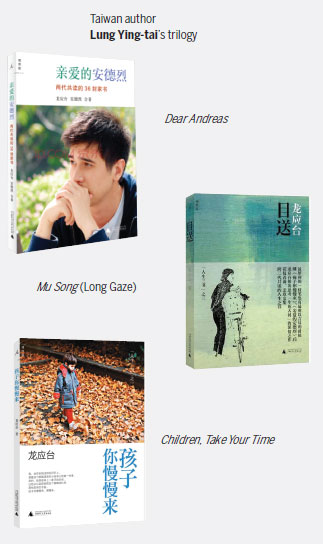Look back with love and longing
Updated: 2015-08-14 07:52
By Guo Shuhan(HK Edition)
|
|||||||
"I have gradually realized that the time of predestined gathering between children and their beloved parents lapses little by little over their every lingering gaze after one another's distant receding backs."
The above is an oft-quoted line from Mu Song (Long Gaze), the last book in a trilogy by the Taiwanese author Lung Ying-tai, based on her own life. The other two titles are translated as Children, Take Your Time and Dear Andreas.
Essentially a compilation of essays, these books make a rich repository of anecdotes, based on Lung's relationship with her family. Many of the incidents recalled here are rather trivial, moments of pleasure or sorrow experienced as part of one's everyday life.
Lung, the second child of a former soldier who moved to Taiwan after the Kuomintang retreated in 1949, is better known for her poignant and sometimes biting writing. However, this series shows a gentler, more human, side of Lung, as a mother, daughter and wife.
Having her first child at 34, Lung says, coincided with her entering the university of life. Her poor performance at this new school would often leave her feeling inadequate.
The three books can be regarded as a kind of homework assignment through which the author is made to come to terms with her children growing up, aging parents, the death of her father and her personal enrichment through coping with these experiences.
Children, Take Your Time is about the joyful years of raising her two boys in Germany. It is a vivid account of the boundless love and trepidation a new mother feels towards her infant children when they are too small and utterly vulnerable. As the boys got a little older, she guided them to come into their own and "grow up like erect saplings". The book is an attempt to capture certain memories of her sons' childhood years that Lung would like to cherish forever.
Dear Andreas is a collection of 36 letters and e-mails exchanged between Lung and the oldest son, Andreas. Lung left Germany to take up a post in Taipei when Andreas was 14. Over the next four years they seldom saw one another. By the time the job ended, Lung was a little saddened to think about her distance with her now grown-up son.
She then suggested they do a newspaper column based on the correspondence between them, which, unexpectedly, lasted more than three years.
In the time of e-mail, they were using an "outdated" communication method, but it helped the mother "to step into the world of the first 18-year-old person in her life" and the son too "began to understand his mother". They talked about everything, romance, friendship, cultural differences, political issues, among others.
Mu Song looks at some of the most difficult issues people have to face in their lives: their parents' aging and death, their own defeat and emotional fragility, having to deal with loss and renunciation.
The life series can be read as a journey from the cradle to grave, or in the reverse direction. Either way a reader is able to appreciate the predestined gathering of relatives that Lung talks of.
Having read the series one might indeed feel that true happiness may be as simple as "someone who bids you farewell in the morning, and then arrives home in the evening as usual, dropping his school bag in the same old corner and hiding his smelly football shoes beneath the usual chair".

(HK Edition 08/14/2015 page10)